This week’s highlights
- Prince Murhula, JHR’s DRCongo Project Manager, Recognized as the winner of the « Patriote en Or » Award in DRCongo
- #BlackHistoryMonth: Profiling Winnie Syombua
- #BlackHistoryMonth: Profiling Jima Francis Wani Abrama
- #BlackHistoryMonth Webinar: Black-Indigenous Narratives in Media
- Introducing JHR’s Board: Adrian Harewood!
- Indigenous Journalists! Submissions Call for 2nd Annual Award for Outstanding Work by an Indigenous Youth Reporter
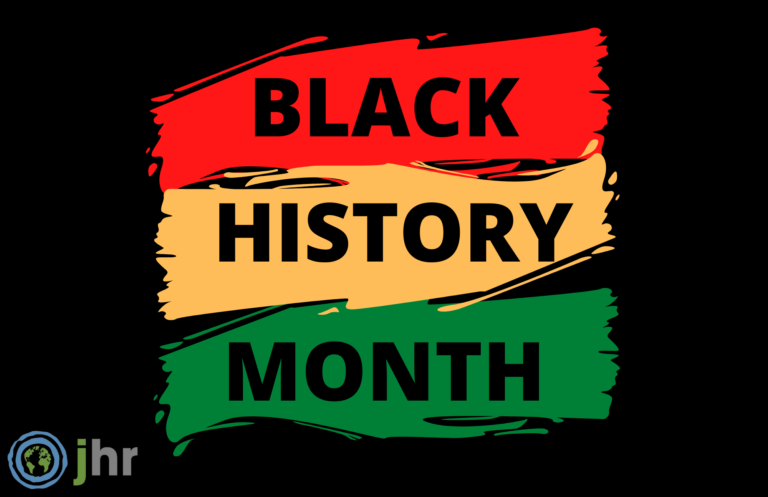
In honour of Black History Month, JHR would like to take a moment to recognize and highlight several leading Black media and international development luminaries within our organization. The international development sector has long been criticised for perpetuating systems that undervalue local knowledge and expertise in favour of eurocentric knowledge and leadership. Through this prism, Black and Brown people are often stripped of their agency as changemakers reinforcing structural inequality and dependency. Rarely do locals hold leadership positions in many of the international development organisations operating in the global south. Yet the marginalization of local expertise has grave implications for the overall impact and long-term sustainability of any given development project.
The
#BlackLivesMatter movement has pushed many international development organizations to reflect on the issue of institutional racism within the sector. This self-reflection should involve questioning whose expertise we value and leadership we trust. At JHR we seek to dismantle embedded racist practices by promoting Black and Brown leadership and centering local expertise. This has been JHR’s practice since the first JHR project in Ghana in 2006, led by renowned Ghanaian radio journalist and personality
Ato Kwamena Dadzie. As you’ll see reading through this newsletter, all JHR programs in the Global South are led by nationals. By centering local expertise and emphasizing local ownership, JHR has been able to achieve great success in some of the most volatile environments in the world. Nevertheless, we recognize that more work needs to be done to address institutional racism within the international development sector.
This week’s edition will focus on highlighting the achievements and centering the voices of our Black employees. It also introduces you to JHR Board member Adrian Harewood, leading Canadian journalist and news anchor, who joined the Board’s ranks last year.
Prince Murhula, JHR’s DRC Project Manager, Recognized as the winner of the « Patriote en Or » Award
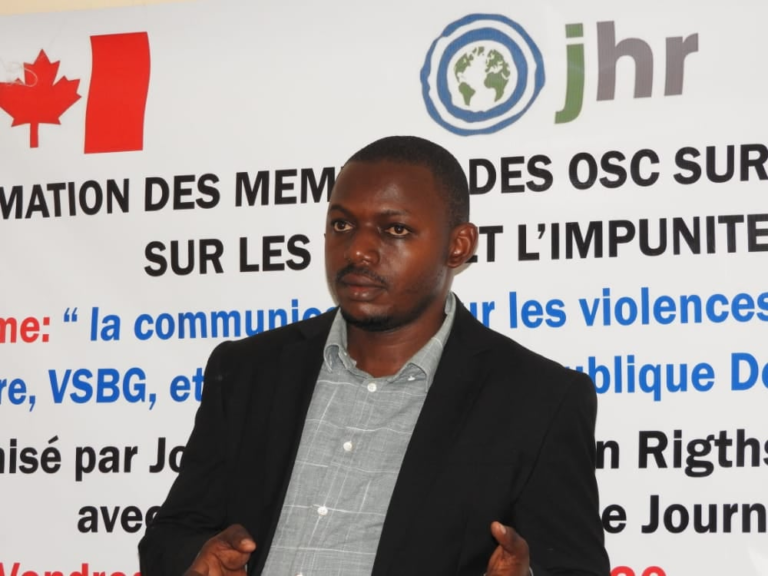
Photo Credit: JHR DRC
This month, Prince Murhula, the Project Manager for JHR in the Democratic Republic of Congo (DRC), learned that he had won the prestigious “Patriote en Or” citizen award, in the Press & Media category. The “Patriote en Or” award is an initiative by the New Dynamics of Civil Society (NDSCI). It aims to recognize, celebrate, and affirm the achievement of Congolese men and women and to present to the world a different image of Congolese people.
The Nobel Prize winner, Dr. Denis Mukwege, was the recipient of the 2014 edition of the award. The prize is awarded each year to Congolese personalities who distinguish themselves in fields such as media, governance and human rights, following a popular vote. This achievement is a richly-deserved testament to Prince Murhula’s dedication and passion for human rights.
Prince Murhula is a lawyer by training, a human rights advocate and an award-winning journalist with over 10 years of experience. Winner of the 2010 JHR Human Rights award, Prince took the funds from the prize to launch “Journalists for the Promotion of Democracy and Human Rights”, a network of journalists from South Kivu committed to the promotion of human rights and gender equality. Later on, he co-founded L’École Technique de Journalisme, the first technical journalism training institutes in Eastern DRC, which largely sustains itself from fees paid by local journalists and media partners; the organization uses JHR’s curriculum, among others, to teach a form of journalism that centres human rights in its practice.
In 2019, Prince was ranked among the 50 most influential young Congolese. Prince is a true example of visionary leadership, integrity, and #BlackExcellence. We at JHR are inspired and proud to work with a man of Prince’s calibre.
#BlackHistoryMonth: Profiling Winnie Syombua
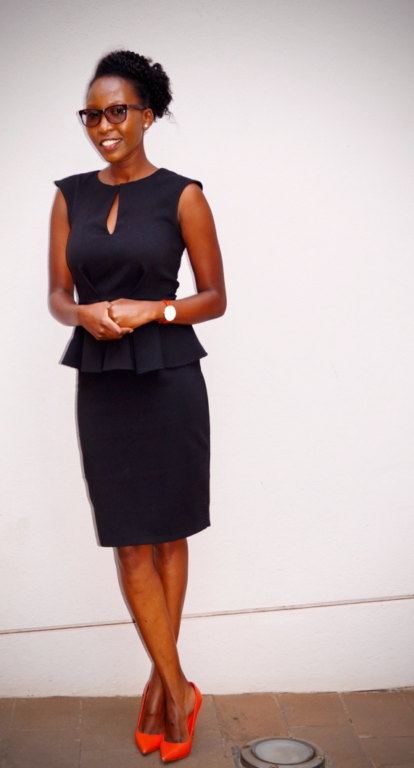 Winnie Syombua
Winnie Syombua
Winnie Syombua is the current Gender Specialist for JHR’s project “Canada Work: Voice for Women and Girls” in Kenya.Winnie is a policy, governance, gender and human rights expert who has worked with institutions and individuals to provide cutting edge solutions to policy, democracy, governance and human rights challenges in Africa and beyond. She holds a Bachelor of Arts in Politics (UoN), an MA, Gender and Development (UoN) and an MA, Governance and Public Policy (University of Sheffield UK).
How long have you worked for JHR?
I have worked with JHR for four months now, starting October 2020.
Share your career journey. What led you down the path of your current profession?
Growing up, I witnessed instances of inequality and discrimination visited upon people and it would gnaw on my conscience for days. In fact, I would pester my mother to do something about any injustice I had witnessed. This drove me to want to pursue a career in law so that I can help those who couldn’t speak for themselves. When I finished school, I joined the Kenya National Commission on Human Rights, a national human rights institution with the mandate to promote and protect human rights in Kenya. Interestingly, I started with creating public awareness on human rights and thereafter transitioned to the use of policy to advocate for the observance of human rights. While at the Commission, I interacted with different subjects of human rights and for me, access to justice and gender equality stood out. There is an obvious nexus between gender equality and access to justice. Women, who are mostly marginalised, tend to be at the seeking front of justice, but because of the lack of awareness and inadequate support structures, they fall out of the process, leaving them with the same issues that caused them to want to seek justice in the first place.
This knowledge has shaped my interest in sharing my skills and knowledge on these subjects. I have taken deliberate career steps in confronting the socio-economic drivers of gender inequalities and in building the momentum for progressive reforms, changing social norms and amplifying the leadership role of women. Through my education, I have gained adequate skills and knowledge which have helped me in making deliberate decisions wherever I have worked. I have also found myself seeking career opportunities that allow me to use the existing channels to demand for accountability and interrogate policy issues surrounding gender equality and access to justice. I find JHR the perfect place to put this into practice.
How has your cultural background shaped your professional and personal journey?
I am a Black African female who has worked, lived and studied abroad at one point in time. My cultural background has influenced how I perceive problems and conceive solutions, including career choices because I always want to serve where I’m most impactful. This has in turn affected the opportunities I seek, the knowledge I crave for and how I go for it. I must however confess that when in multi-cultural forums, I have experienced surprised stares and comments especially if something you say or do comes out as smart, forward-looking, innovative or brilliant. There have been instances where I have been offered opportunities because my ideas are beyond Africa but because of my love for transforming my society, I politely decline. On a personal front, I think I am an avid defender of “Africanness”. I see sameness and equality in people beyond colour or race and so I aim to treat them that way.
What has been your biggest achievement so far in your career?
Establishing a centre for applied human rights in Kibera, Africa’s largest slum. I had worked with the area Member of Parliament who also happened to be an avid human rights champion. In fact, his passion saw him establish a parliamentary caucus on human rights between 2013 and 2019. It is while working with him that the idea of establishing an organisation that would work towards improving livelihoods through the promotion of and access to human rights and sustainable development initiatives was born. The Centre was founded as an initiative to bridge the gap between government responsibility and community realities in accessing rights and opportunities for development in an informal settlement like Kibera. The organisation has been in the forefront in providing solutions to human rights, governance, quality education, social cohesion and development challenges. It has been a leader in championing women and girls’ rights- in fact, during the lockdown occasioned by the pandemic, the Centre was instrumental in coordinating GBV response services and a myriad of other economic support oriented activities for the community, the majority of whom are indigents.
What’s something most people don’t know about you/ a fun fact about you?
I am a creative who likes to experiment with a lot of things, from crafting new recipes out of nowhere, farming most of what I eat, to designing and tailoring my clothes. Heck, I even do my own hair! Lately, I have taken to making chocolates at home, so if you have a party or feel like indulging, holla at me…
What do you like the most about your work with JHR?
I like the fact that we work with journalists, people who have got the tools to transform society by sharing valuable and timely information. More so, I like that our work involves building the capacity of these journalists, including those in the grassroots to tell stories objectively and from a human rights lens. Oftentimes, it delights me to see a journalist realise that they have been contributing to the promotion and protection of human rights all along, they just didn’t connect the concept of human rights and that of journalism. The realisation is profound, and how they embrace it and turn it into a tool of change is phenomenal.
#BlackHistoryMonth: Profiling Jima Francis Wani Abrama
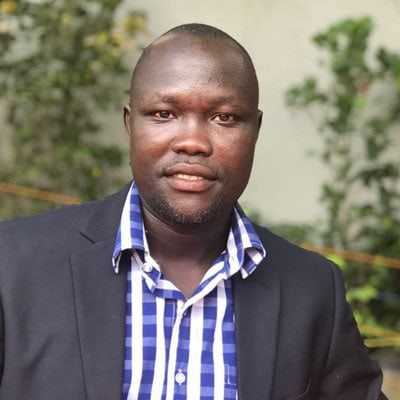
Photo Credit: Jima Francis Wani Abrama
Jima Francis Wani Abrama is the current Regional Project Coordinator for the Project “Mobilizing Media to Fight COVID-19”. Jima holds a Masters in Television, Radio, and Film from S.I Newhouse School of Public Communication, Syracuse University, New York State.
How long have you worked for JHR?
I have worked for JHR for four years, from February 2018 to date. I started as the project coordinator for JHR’s project in South Sudan “ Strengthening Media in South Sudan.”
Share your career journey. What led you down the path of your current profession?
I have always admired and listened to BBC Focus on Africa. My love for storytelling and passion for journalism drove me towards my current profession.
When I was in secondary school (Moyo Secondary School) in Uganda, I was an information prefect. I would organize my broadcast team mimicking the BBC news style. In 2007, when I came to South Sudan, I started practicing real journalism, writing for newspapers and reporting for radio stations, as well as online reporting. I received a lot of short training on various topics, within South Sudan and around the region.
In 2010 I joined Uganda Christian University (UCU) to study Mass Communication, and I graduated in 2013 with a major in Broadcast. I then started working as a news reporter for South Sudan Broadcast Corporation (SSBC). I later on moved to Eye Media and become a radio producer and presenter at Eye Radio. I then transitioned to BBC Media Action as a Radio Trainer across the Country and also became a Lecturer for Media Development Institute (MDI).
I finally joined Journalists for Human Rights (JHR) as a Media Trainer in 2018 and later became the Project Coordinator for JHR in 2018-2020. Currently, I serve as the Regional Project Coordinator for JHR’s Media Monitoring to Fight COVID-19 project 2020-2021.
How has your cultural background shaped your professional and personal journey?
My culture places a high value in speaking freely, respect for one another and equity in every sector of our society. The fear of God is paramount among my kinsmen. There are those values that we learn by instinct and they influence our lives. These values have shaped my professional and personal career, without question.
What has been your biggest achievement so far in your career?
My biggest achievement is getting my Masters in Television, Radio, and Film from S.I Newhouse School of Public Communication, Syracuse University, New York State. “Knowledge is power” and I achieved that power. That is a mega achievement.
What’s something most people don’t know about you/ a fun fact about you?
Most people don’t know that I have officially changed my name from Juma John Stephen to Jima Francis Wani Abrama.
What do you like the most about your work with JHR?
JHR has great teamwork, smooth coordination and is community focused.I love JHR’s direct project support to beneficiaries of its projects. This has created a positive impact on communities they work in. JHR is a small organization with a big impact on communities.
#BlackHistoryMonth Webinar: Black-Indigenous Narratives in Media
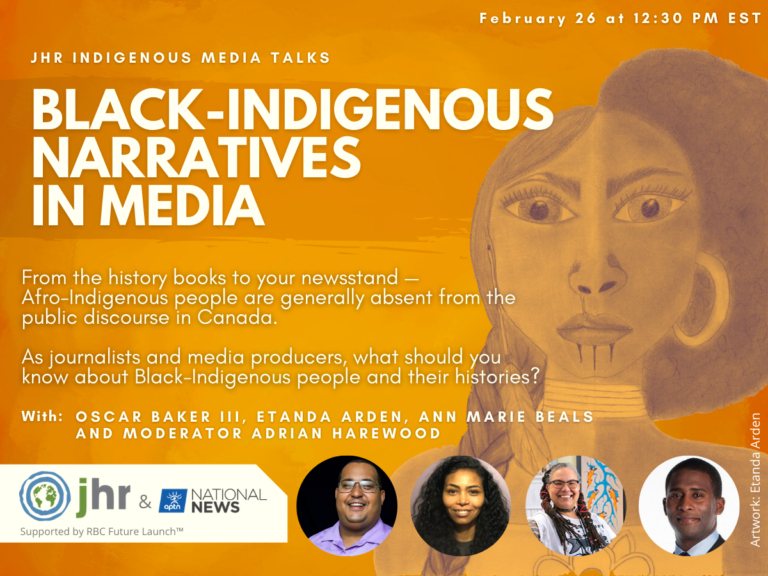
Relationships between Indigenous and Black peoples have existed in what is now called Canada for more than 400 years. Across the country there are Black-Indigenous or Afro-Indigenous peoples with rich and diverse histories, yet their stories are almost entirely missing from both the history books and from public discourse.
In honour of Black History Month, JHR’s Indigenous Reporters Program has invited three Black-Indigenous storytellers to share their experiences and perspectives. JHR Board member and CBC news anchor Adrian Harewood (about whom more below) will moderate a discussion on Black-Indigenous history, current issues, and what it all means for the media – with Oscar Baker III, Etanda Arden, and Ann Maire Beals.
Date: Feb 26, 2021 12:30 PM EST (Projected event time 12:30-1:30PM)
Introducing JHR’s Board: Adrian Harewood!
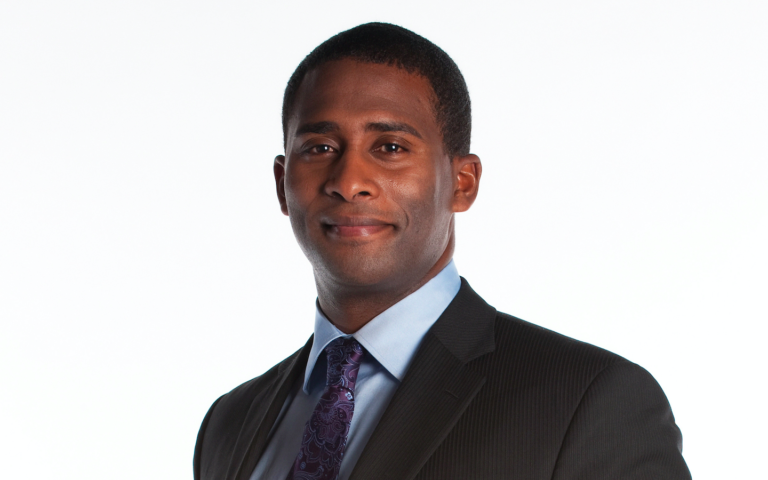 Photo Credit: CBC Canada
Photo Credit: CBC Canada
Adrian Harewood joined JHR’s Board in September of 2020. A recognized leader in journalism and human rights, and an articulate visionary of the anti-racism movement in Canadian media, he is co-host of CBC Ottawa News at Six.
Adrian is a McGill graduate. While at McGill, he was the station manager of CKUT – Radio McGill. He has also been involved in community radio at CKCU (Carleton University) and CHUO (University of Ottawa). He has been a guest host on national CBC programs such as As it Happens, Sounds Like Canada and The Current. Before coming to television, he was the host of All In A Day on CBC Radio One in Ottawa.
Adrian brings a uniquely valuable perspective to the Board, as a community radio reporter who has prioritized reporting on human rights throughout his career. Says JHR Executive Director Rachel Pulfer: “I first encountered Adrian when he was hosting The Current, in 2004. I remember he asked Bill Clinton what the response was in the Clinton White House while the Rwandan genocide was ongoing. Clinton paused, then said that he’d never been asked that on live radio before. He went on to admit that there were no high level meetings at the White House on the genocide the entire time it was happening. That realization and acknowledgment spurred Clinton to start the Clinton Global Initiative. I was just starting out as a journalist at the time and that interview really struck me as a great example of how radio can be used to hold powerful people to account on human rights issues.
I am delighted and honoured that Adrian agreed to join the Board. Here’s some context on why he decided to join and what he hopes to achieve in the role.”
What attracted you to JHR?
I like the organization. I like what it does.
What do you see as priorities in your role as Board member?
I want JHR to continue and I want it to grow. I want more people to know about JHR and what it does. I want it to expand and be able to reach more communities, and be relevant to more communities. If I can help with that, I’ll feel like I’ve done my job.
Where do you see gaps or opportunities for JHR?
I think JHR needs to expand beyond the people it currently attracts. Right now, in Canada, I see JHR as attracting a community that is very progressive minded, very professional, civic leaders, white, upper middle class. I think JHR would benefit from being more representative, and expanding its scope. The organization has credibility, it is on its way, but it needs to take the steps to expand beyond this core group.
Submissions Call for 2nd Annual Award for Outstanding Work by an Indigenous Youth Reporter
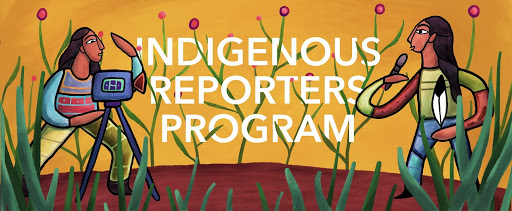
Journalists for Human Rights (JHR) is pleased to announce the call for submissions to the 2nd Annual Award for Outstanding Work by an Indigenous Youth Reporter. The award is supported by the RBC Foundation as part of RBC Future Launch, the bank’s 10-year, $500-million commitment to preparing Canadian youth for the jobs of tomorrow.
To apply, please submit an application to [email protected] by Sunday, February 28, 2021, with ‘Indigenous Youth Reporter Award’ in the subject line. Read full details here.
We wish to acknowledge the land on which the Journalists for Human Rights’ head office operates and recognize the longstanding relationships Indigenous nations have with these territories. For thousands of years it has been the traditional land of the Huron-Wendat, the Seneca, and most recently, the Mississaugas of the Credit River. Tkaronto (Toronto) is in the Dish with One Spoon Territory and is home to Indigenous peoples from many nations across Turtle Island who continue to care for this land today.
To read more on JHR’s land acknowledgement,
click here.









